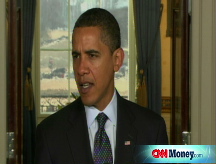Obama's pay caps: The good and bad
Executive pay expert Pearl Meyer says the limits may be politically popular, but aren't very effective at changing management thinking.
(Fortune) -- When it comes to executive compensation, Pearl Meyer has seen it all. She started her career more than 30 years ago, at Kraft, founding her own eponymous firm in 1989 and later selling it. Now senior managing director at Steven Hall & Partners, Meyer has the kind of perspective on President Obama's pay restrictions that can only come from a veteran of the business. In an interview with Fortune's Jennifer Reingold, she talked about what's good and bad in it.
Q: Pearl, what do you make of the Obama plan? Will it change the way banks pay their executives?
A: I think it's clever. It's well designed from the perspective of the government trying to balance incentives with the need to satisfy the concerns of the public and the Congress. What they are trying to do, I believe -- how should I put this delicately -- is to meet the expectations of the public. But I don't know how effective it will be in motivating and retaining the people we need for the long haul.
It sounds very good if you believe that the people who are now in charge were responsible for the disaster. But these disasters were caused by a small segment of the managing population and the problem is proper oversight by senior management, most of which are gone. Now there is a cadre of executives who are going to be punished or penalized for the actions of others. I am concerned that these institutions won't be able to maintain the quality of their hires.
Q. But what else would they do? Go to other companies that didn't take TARP funding?
A. Exactly, yes. Right now AIG (AIG, Fortune 500) is hemorrhaging people and they are being grabbed up right and left.
Q: Are there specific elements of the plan that you like or don't like?
A: Some of these things are very sensible, like don't redecorate your office. On the other hand, the nonsense about Wells Fargo (WFC, Fortune 500) not being able to have a sales meeting is terrible. It's business. They're going to have to have sales conferences and people are going to have to pay for them.
If you really look at it, though, they didn't really limit executive pay. They limited current cash compensation to $500,000. Continuing to grant restricted stock and other long-term incentives represents an opportunity for long-term wealth accumulation, considering the depressed value of the stock. AIG is now at around $1 a share...if people could get restricted stock at a dollar and bring that company back, they could easily make up for what they've lost in cash.
Q: This is not the first time government has tried to limit compensation. What has been the result in other attempts?
A: Ideologically I think that if it was not a quid pro quo [meaning, that this is in return for government funding], it would be a very bad idea. Every time we've had regulatory interference with the marketplace, it has boomeranged. I've gone all the way back to Nixon's wage controls. It was a complete failure. There was a limitation of 4% on all salary increases, but before that many companies weren't giving 4%. After that they all were. And the year after the controls expired, salaries increased 10%.
The same thing happened with the $1 million cap on the tax deductibility on executive salaries. And the limit of 2.99 times salary for the tax deductibility of golden parachutes [severance or change-in-control payments made to executives]. No one was getting that before: The average was 1.5 times. People were coming to me saying, "Mrs. Meyer, why am I only getting 1.5 when the government lets you do 2.99?" It just boomerangs. ![]()
-
 The retail giant tops the Fortune 500 for the second year in a row. Who else made the list? More
The retail giant tops the Fortune 500 for the second year in a row. Who else made the list? More -
 This group of companies is all about social networking to connect with their customers. More
This group of companies is all about social networking to connect with their customers. More -
 The fight over the cholesterol medication is keeping a generic version from hitting the market. More
The fight over the cholesterol medication is keeping a generic version from hitting the market. More -
 Bin Laden may be dead, but the terrorist group he led doesn't need his money. More
Bin Laden may be dead, but the terrorist group he led doesn't need his money. More -
 U.S. real estate might be a mess, but in other parts of the world, home prices are jumping. More
U.S. real estate might be a mess, but in other parts of the world, home prices are jumping. More -
 Libya's output is a fraction of global production, but it's crucial to the nation's economy. More
Libya's output is a fraction of global production, but it's crucial to the nation's economy. More -
 Once rates start to rise, things could get ugly fast for our neighbors to the north. More
Once rates start to rise, things could get ugly fast for our neighbors to the north. More








